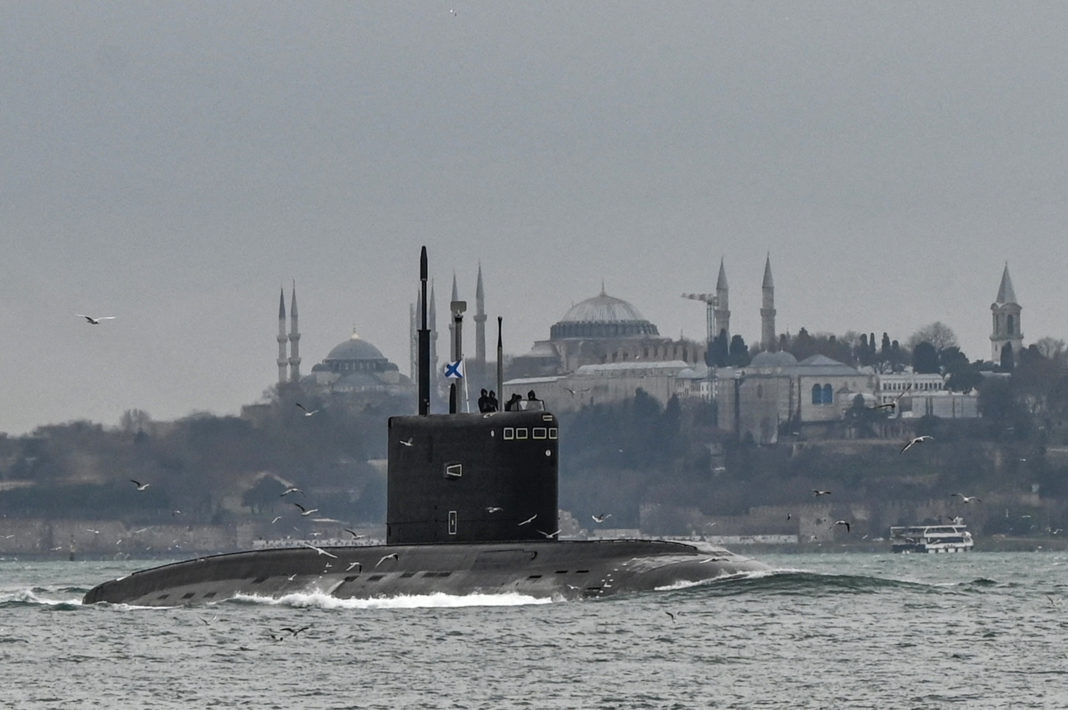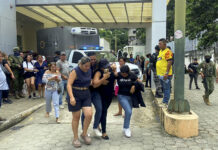Russia said Monday that a diplomatic solution to Moscow’s standoff with the West was still possible and that some of its military drills were ending, after tensions over Ukraine reached fever pitch.
The comments came after German Chancellor Olaf Scholz landed in Kyiv for crisis talks ahead of a visit to Moscow to head off what Berlin said was the “very critical” threat of a Russian invasion of Ukraine.
During a televised meeting with President Vladimir Putin, Russian Foreign Minister Sergei Lavrov said “there is always a chance” to reach an agreement with Western countries over the standoff.
He told Putin that dialogue with leaders in European capitals and Washington should continue and that “opportunities are far from exhausted” for a resolution.
“I would suggest continuing” talks, Lavrov said.
On his arrival in Ukraine, the German leader headed directly to see President Volodomyr Zelensky, whose government has demanded an urgent meeting with Russia to explain why it has deployed more than 100,000 soldiers to Ukraine’s borders.
European leaders warn that the troop build-up is the worst threat to the continent’s security since the Cold War, as Putin demands a rollback of Western influence in eastern Europe and a ban on Ukraine joining NATO.
– ‘Critical’ threat –
Western allies have prepared what they warn would be a crippling package of economic sanctions in response.
Earlier, a German government source had said: “We assess the situation as very critical, very dangerous.”
Western alarm over Ukraine has been fuelled by recent Russian military exercises, including Belarus, where the US said Moscow had dispatched 30,000 troops for more than a week of drills.
Russia’s Defence Minister Sergei Shoigu told Putin in a meeting Monday that some of the drills were “ending” and some would end “in the near future”.
In Kyiv, Ukraine’s Defence Minister Oleksiy Reznikov hailed “positive” talks with his Belarusian counterpart. He said he had been assured “there are no threats to Ukraine from Belarus”.
US intelligence officials worry that weeks of crisis talks have given Russia the time to prepare a major offensive should Putin make the ultimate decision to attack Ukraine.
“We are digging trenches that Ukrainian soldiers could quickly jump into and defend in case the Russians attack,” 15-year-old Mykhailo Anopa told AFP.
He was speaking near the frontline separating Kyiv-held territory from that under the control of Moscow-backed insurgents in the separatist east.
– Ukraine demands answers –
Washington reaffirmed its warning on Sunday that Russia was now ready to strike at “any moment”. It said the assault was likely to start with “a significant barrage of missiles and bomb attacks”.
Ukraine requested a formal meeting with Moscow and other members of the pan-European security body, the OSCE, that might explain “the reinforcement and movement of Russian forces along our border”.
On Sunday, the Ukrainian presidency said Zelensky had also urged US President Joe Biden to visit Kyiv “in the coming days” to show moral support.
The White House made no mention of the invitation in its readout of the 50-minute call.
The United States on Saturday ordered all non-emergency staff to leave its embassy in Kyiv.
– Tough trip –
Germany plays a central role in efforts to mediate in eastern Ukraine, where a gruelling conflict with Russian-backed separatists has claimed more than 14,000 lives.
But Germany’s close business relations with Moscow and heavy reliance on Russian natural gas imports have been a source of lingering concern for Kyiv’s pro-Western leaders and Biden’s team.
Scholz has warned Russia it should “not underestimate our unity and determination” but also hedged against unequivocally backing Biden’s pledge to “bring an end” to Russia’s new Nord Stream 2 gas link to Germany.
Kyiv is also upset with Berlin for not having joined some of its NATO allies in starting to send weapons to Ukraine.
Ukraine’s ambassador to Berlin, Andriy Melnik, fumed at “German hypocrisy” in a tweet on Sunday, saying Germany was exporting “dual-use goods to Russia” but offering “no weapons for Ukraine’s self-defence”.
Scholz’s visit to Moscow on Tuesday follows tit-for-tat closures of the German-language service of Russia’s RT network and the Moscow bureau of Germany’s Deutsche Welle.
– Airline worries –
A growing number of Western countries are withdrawing staff from their Kyiv embassies and urging their citizens to leave Ukraine immediately.
But departures may be complicated by the looming threat of the skies over Ukraine closing due to rising risks for airlines.
Dutch carrier KLM became the first major airline over the weekend to suspend flights to Kyiv indefinitely.
On Monday morning, ahead of the potential shutdown, Kiev’s international airport was busy but there were no signs of panic despite long queues to depart.
Ukraine’s budget airline SkyUp said European leasing companies were demanding that Ukrainian carriers return their planes to EU airspace within 48 hours.
Industry analysts believe other international airlines may soon also ban flights into Ukraine because of the growing cost to insurers.
© Agence France-Presse










